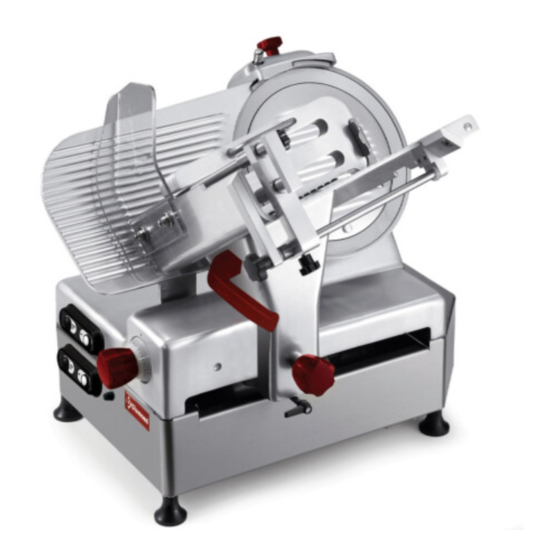Diamond 350 Use And Maintenance Manual - Page 6
Browse online or download pdf Use And Maintenance Manual for Kitchen Appliances Diamond 350. Diamond 350 16 pages. Ce professional slicer

2.3 - ELECTRICAL CONNECTION
Check that the specifications provided
in the rating plate -serial number (Fig.
n°17) and in the consignment and deliv-
ery documents, correspond; if not con-
tact the supplier immediately.
Check power supply cable and slicer
earthing .
2.3.1 - Slicer with single-phase motor
The slicer is fitted with a power supply cable having a cross section of 3x1mm²;
approximate length 1.5m and a "SHUKO" plug. Connect the 230 V - 50 Hz sli-
cer, interposing a 10 A I= 0.03A thermomagnetic differential switch.
2.3.2 - Slicer with 400 V. three-phase motor
The slicer is fitted with a power supply cable having a cross section area of
5x1mm², approximate length 1.5m and a red 15A 3F + T CEI plug. Connect the
slicer to the 400 V - 50Hz three-phase supply mains, interposing a 10 A I=
0.03A thermomagnetic differential switch.
2.3.3 - Slicer with 230 V. three-phase motor
The slicer is fitted with a power supply cable having a cross section area of
5x1mm², approximate length 1.5m and a blue 15A 3F + T CEI plug. Connect the
slicer to the 230 V - 50Hz three-phase supply mains, interposing a 10 A I=
0.03A thermomagnetic differential switch.
Check blade rotation is anti-clockwise looking at the slicer from bladeguard side.
If not proceed as in 2.3.4 .
2.3.4 - Blade rotation direction
Check the direction of the blade
rotation with a pulse of the "I" push-
button (ON), immediately followed by
the "0" push-button OFF.
The direction of the blade rotation
must be counter-clockwise when loo-
king at the slicer from the bladeguard
side (Fig. n°18). In the case that the
rotation direction is not exact, invert
Fig. n°17
Fig. n°18
8
(Fig. n°19) the position of two of the
three phase wires (black, gray or
brown) in the plug.
2.4 - WIRING DIAGRAM
2.4.1 - Single-phase 230 V. tension selection
Fig. n°19
Fig. n°20
9
